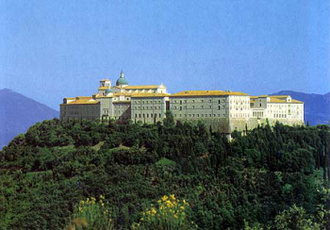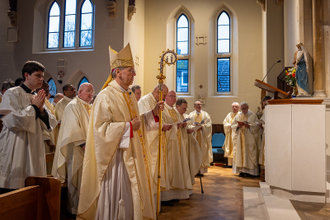Pope Benedict in Montecassino

Pope Benedict visited the town of Cassino and the monastery of Montecassino on Sunday. After arriving by helicopter Benedict celebrated Mass in Piazza Miranda before visiting the monastery and Polish cemetary.
Focusing his Sunday Mass homily on the Ascension of the Lord,the Pope told the 20,000 people present that "heaven does not mean a place above the stars, but
something much more daring and sublime. It means Christ Himself, the divine Person Who fully and forever welcomes humankind, the One in whom God and man are always inseparably united. And we approach heaven, or rather we enter heaven, in the extent to which we approach Jesus and enter into communion with Him. Hence, today's Solemnity of the Ascension invites us to profound communion with Christ, Who died and rose again, and is invisibly present in the lives of each one of us".
The Holy Father also mentioned the Rule of St. Benedict which indicates that nothing should be placed before Christ. "This", he said, "does not distract us, on the contrary it encourages us to commit ourselves to building a society in which solidarity is expressed through tangible signs". In this context he recalled how Benedictine spirituality "suggests an evangelical programme summarised in the motto: 'ora et labora et lege' (prayer, work and culture)".
He explained: "In the first place, prayer, which is the greatest heritage
St Benedict left to his monks, ... is the silen path that leads directly to Gods' heart; it is the breath of the soul that restores peace to us amid the storms of life". The Pope likewise expressed to his listeners the hope that "attentive listening to the divine Word may nourish your prayers and make you prophets of truth and love in a shared commitment to evangelisation and human promotion".
On the subject of work, Benedict XVI indicated that "humanising the world of work is typical of the soul of monasticism". In this context he spoke of his solidarity "with people living in situations of worrying insecurity, workers made redundant or who have even lost their jobs. May the blight of unemployment which affects this land induce leaders of public life, employers and others in a position to do so, to seek, with everyone's help, convincing solutions to the employment crisis, creating new jobs and safeguarding families".
"How can we fail to recall that the family today has an urgent need for better protection, because it is threatened at its very roots?" the Pope asked. "I am thinking too of young people who struggle to find dignified employment that enables them to build a family of their own. I would like to say to them today: do not lose heart, dear friends, the Church will not abandon you!"
The Holy Father also mentioned the care Benedictines dedicate to culture and education. "I know", he said, "that in preparation for my visit you recently held a conference on the theme of education so as to arouse in everyone a strong determination to transmit to young people the irreplaceable values of our human and Christian heritage. In the cultural efforts being made today with the aim of creating a new humanism you, faithful to the Benedictine tradition, rightly intend to emphasise attention to weak and fragile man, to the disabled and to immigrants".
The Pope concluded: "It is not difficult to see that your community, this
portion of the Church that lives arou d Montecassino, is heir to and repository of the mission - impregnated with the spirit of St Benedict - to proclaim that no-one and nothing in our lives must dislodge Jesus from first place; the mission to build, in Christ's name, a new humanity that welcomes and helps the weakest".
After the Mass, the Pope gave a short address to the thousands of people gathered in Cassino's Piazza Miranda, which from today will be known as Piazza Benedetto XVI.
Referring to what he described as "the need of all humankind fully to savour the richness and power of Christ's peace", the Holy Father recalled how the ord "Pax" is written over the entrance to the abbey of Montecassino and to all Benedictine abbeys.
"As you know", he continued, "on my recent visit to the Holy Land I myself became a pilgrim of peace, and today - in this land marked by the Benedictine charism - I have the opportunity to emphasise once again that peace is rimarily a gift of God, and therefore its power lies in prayer".
The gift of peace however, Benedict XVI explained, "is entrusted to human endeavour. ... It is therefore vital to cultivate an authentic life of prayer in order to ensure that social progress comes about peacefully. ... Only by learning, with the grace of Christ, to struggle against and defeat the evil in ourselves and in our relations with others can we become authentic builders of peace and of civil progress.
"May the Virgin Mary, Queen of Peace", he added, "help all Christians, in
their various vocations and life situations, to be witne ses to the peace
that Christ gave us", the peace He "left us as a mission to be carried out
always and everywhere"
The Pope then recalled how the 24 May is dedicated to the Blessed Virgin Mary, Help of Christians - who is venerated with great devotion in the Shrine of Sheshan in Shanghai, China - marks the Day of Prayer for the Church in China. My thoughts go to all the Chinese people", he said. "In particular, I send a most affectionate greeting to Catholics in China and I exhort them, on this day, to renew their communion of faith in Christ and of faithfulness to Peter's Successor. May our joint prayer obtain an effusion of gifts from the Holy Spirit so that unity among Christians, and the catholicity and universality of the Church, may always become more profound and visible".
In the afternoon Pope benedict visited the Abbey of Montecassino, whih was destroyed by bombs during World War Two and rebuilt. He said that Montecassino, like the ancient oak planted by St Benedict, has been 'pruned' by the violence of war, but has grown back stronger than before".
St Benedict abandoned everything to follow Jesus and, "incarnating the
Gospel in his own lif became the initiator of a vast movement of spiritual
and cultural renewal in the West", said the Pope. Referring then to the
account of St Gregory the Great, who explains how St Benedict "was 'raised
aloft' by an indescribable mystical experience", the Holy Father highlighted
the fact that the saint "received this divine gift not to satisfy his
intellectual curiosity but so that the charism God had granted him could
reproduce in the monastery the life of heaven itself, recreating the harmony
of the creation through contemplation and work.
"Rightly so, then", the Pope added, "the Church venerates him as an 'eminent master of monastic life and as a 'doctor of spiritual wisdom in his love for prayer and work'. ... St Benedict was a shining example of sanctity and indicated Christ to his monks as the one great ideal to follow. He was a master of civilisation who, while presenting a harmonious and balanced view of divine needs and of man's ultimate goal, remained well aware of the requirements and reasons of the heart, teaching and fomenting true and constant fraternity so that, in the interplay of social relationships, a unity of spirit capable of building and nourishing peace should not be lost".
The Holy Father went on: "It is no coincidence that the word 'Pax' welcomes and visitors at the door of this abbey", which "stands as a silent admonition to reject all forms of violence and build peace: in families, in communities, among peoples and in all humankind".
Following St Benedict's example, "monasteries have, over the course of the centuries, become lively centres of dialogue, of meeting and of beneficial fusion among different peoples, brought together by the evangelical culture of peace. Through work and example, the monks were able to teach the art of peace, giving tangible form to the three elements identified by Benedict as being necessary to conserve the unity of the Spirit among mankind: the cross, which is the very law of Christ; the book, in other words culture; and the plough, which stands for work, mastery over matter and time".
He continued: "Thanks to the work of monasteries, divided into the threefold daily commitment to prayer, study and work, entire peoples on the European continent have known real liberation and beneficial moral, spiritual and cultural development, being educated in a sense of continuity with the past, real activity for the common good, and openness to God and the transcendental. Let us pray that Europe may always appreciate this heritage of Christian principles and ideals which represent such an immense cultural and spiritual resource.
"This is possible", the Pope added in conclusion, "but only if we accept the constant teaching of St. Benedict: ... that seeking God is man's fundamental task. Human beings do not realise themselves fully, they cannot be truly happy, without God. ... From this place where his mortal remains lie, the patron saint of Europe still invites everyone to continue his work of evangelisation and human promotion".
Following Vespers the Holy Father venerated the relics of St Benedict and
St Scholastica, buried behind the major altar of the basilica.
During the evening Pope Benedict visited the Polish military cemetery at Montecassino which contains the bodies of 1,052 soldiers who died in the battle of May 1944 against German forces occupying the hill n which the abbey stands.
The Holy Father lit a votive candle and recited the following prayer for
the fallen of all countries in all wars:
"O God, our Father,
endless source of life and peace,
welcome into Your merciful embrace
the fallen of the war that raged here,
the fallen on all wars that have bloodied the earth.
Grant that they may enjoy the light that does not fail,
which in the reflection of Your splendour
illumines the consciences of all men and women of good will.
You, Who in Your Son Jesus Christ gave suffering humanity
a glorious witness of Your love for us,
You, Who in our Lord Christ
gave us the sign of a suffering that is never in vain,
but fruitful in Your redeeming power,
grant those who yet suffer
for the blind violence of fratricidal wars
the strength of the hope that does not fade,
the dream of a definitive civilisation of live,
the courage of a real and daily activity of peace.
Give us your Paraclete Spirit
so that the men of our time
may understand that the gift of peace
is much more precious than any corruptible treasure,
and that while awaiting the day that does not end
we are all called to be builders of peace for the future of Your children.
Make all Christians more convinced witnesses of life,
the inestimable gift of Your love,
You Who live and reign for ever and ever
Amen".
Source: VIS















